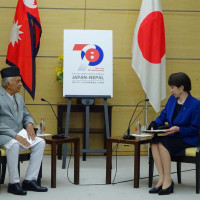- Wednesday, 4 February 2026
Trump’s 100 Days
Bold Promises, Limited Results
As the second term of US President Donald Trump nears its symbolic first 100 days, his impulsive foreign policy has yielded little progress in addressing global conflicts or rewriting international trade rules in the US's favour. Russia continues to bomb Ukrainian territories despite Trump's assertions that he would end the war within 24 hours of assuming office. In the Middle East, Israel has not stopped its aggressive military campaigns against Palestinians, showing little regard for a short-lived ceasefire with the resurgent Hamas. Meanwhile, China remains unwavering in its trade war with the US, offering no signs of compromise. These developments cast doubt on the efficacy of Trump’s strategies, highlighting a recurring pattern of overconfidence and oversimplification in tackling complex global challenges.
In Ukraine, Trump hoped to end the war swiftly, leveraging his long-standing relationship with Russian President Vladimir Putin. His plan included a rapid ceasefire, territorial concessions to Russia, and a reduction in military aid to Ukraine as a means of pressuring Kyiv into compliance. However, Putin outright rejected the ceasefire proposal, even though other terms of the deal were favourable to Russia. Meanwhile, Ukrainians remain resolute in their refusal to cede any territories, including Crimea, currently occupied by Russian forces. Trump’s approach underestimated the intricacies of the conflict and the entrenched positions of the parties involved.
Geopolitical complexities
His reliance on personal deal-making as a substitute for navigating geopolitical complexities has alienated NATO allies and other Ukrainian supporters, who view his concessions as rewards for Russia's aggression. Trump’s exclusion of Ukraine from the US- Russia talks held in Saudi Arabia in February further marginalised Kyiv and raised concerns among US allies. His plan, which would allow Russia to retain control of occupied territories, has been met with widespread criticism. By sidelining Ukraine and NATO members, Trump's strategy risks undermining international cohesion and emboldening future acts of aggression.
Turning to the Gaza conflict, Trump aimed to build on the Abraham Accords, a series of landmark agreements brokered during his first presidency that normalised relations between Israel and several Arab nations, including Saudi Arabia. While these accords marked a significant shift in Middle Eastern geopolitics, they neglected the Palestinian issue, sidelining their longstanding demands for statehood. Trump's overtly pro-Israel actions — such as relocating the US Embassy to Jerusalem (which violates a UN Security Council Resolution), recognising Israeli sovereignty over the Golan Heights (which violates international law), and reducing aid to Palestinian refugees — have only deepened the divide. His rhetoric, including calls for Israel to "finish the job" in Gaza, has emboldened Israel’s far-right government to pursue controversial war practices that have resulted in over 50,000 deaths of Palestinians, mostly civilians, and exacerbated the humanitarian crisis.
Recently, Trump appeared to abandon even the pretense of supporting Palestinian sovereignty. His controversial campaign suggestion to forcibly relocate Gazans to Egypt and Jordan and redevelop the region into a "Riviera of the Middle East," a tourist hub, drew widespread condemnation. Although he later described this proposal as a mere "recommendation," it underscored his transactional mindset and lack of sensitivity to the complexities of the conflict. These missteps have not only deepened tensions in the Middle East but also tarnished the United States’ reputation as a mediator in global conflicts.
Central to Trump’s "America First" agenda is his tariff policy designed to reduce the trade deficit, protect domestic industries, and encourage investment in the US. However, critics argue that these measures have disrupted global supply chains without delivering significant economic benefits. The ongoing trade war with China, marked by high tariffs and retaliatory measures, has had far-reaching consequences. The US has imposed tariffs as high as 145 per cent on Chinese goods, prompting the latter to respond with a 125 per cent tariff on US products. While these rates are largely symbolic, the trade war has hurt not only the two nations but also the broader global economic ecosystem.
US consumers have already begun to feel the heat, with rising prices and declining share values adding to domestic discontent. In response to potential backlash, Trump has rolled back tariffs on essential electronic items such as smartphones. However, these concessions may not be enough to offset the broader economic disruptions caused by his trade policies. China, for its part, appears better positioned to weather the consequences of the trade war. Over the years, it has reduced its reliance on the US market, with exports to the US dropping from over 20 per cent of its total exports in 2018 to less than 15 per cent by 2024, thanks to tariffs Trump imposed on Chinese imports during his first presidency.
Supply chain disruptions
Additionally, China has expanded trade with Southeast Asian and European nations and sought new markets through its Belt and Road Initiative (BRI). Chinese companies have also relocated factories to countries like Vietnam and Cambodia to circumvent US tariffs. While China will still face challenges such as inflation and supply chain disruptions, its diversified trade network provides a cushion against the economic fallout. In contrast, the US faces mounting troubles as domestic industries grapple with supply chain disruptions and higher production costs. The lack of a coherent strategy to address these issues raises questions about the long-term viability of Trump’s trade policies and their impact on the global economic order.
In his second term, Trump’s foreign policy and trade strategies reflect a pattern of bold promises followed by limited results. His transactional approach to diplomacy, characterised by rushed decisions and oversimplified solutions, has alienated allies, deepened conflicts, and disrupted economic stability. From the wars in Ukraine and Gaza to the ongoing trade battle with China, Trump's initiatives have often prioritised short-term gains over sustainable solutions. These missteps not only question Trump’s claim to be a global leader but also raise broader concerns about the effectiveness and coherence of his administration’s approach to international relations.
(A PhD in political science from the State University of New York, Buffalo, the author is a faculty member at IACER. govinda@iacer.edu.np)














